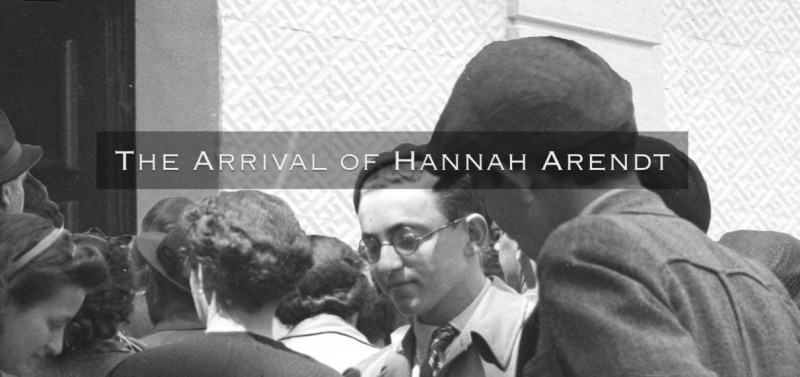
The Arrival of Hannah Arendt
This film describes the arrival of Hannah Arendt - a Jewish, German-American political theorist and publicist - in New York and her reflections on flight and helping people start over.
Ich bin mit dem Konzertpianisten Josef Wagner verheiratet, dessen Karriere sich in aufsteigender Linie befindet. Jedoch – wir sind erst 1 ½ Jahre hier, und seine Einnahmen sind natürlich schwankend. Meine Kraft ist durch den Musikerhaushalt, durch das 5 jährige Kind, durch die Unruhe und Unsicherheit des täglichen Lebens so sehr in Anspruch genommen, dass ich abends erschöpft bin. Es geschieht unter diesen Umständen selten, dass ich abends schreiben kann. Die Gedichteinfälle und Anfangsverse sind da, (sie entstehen bei mir fast immer zwangsläufig) jedoch, um ein Gedicht zu feilen und zu formen, um es zu einem guten Ende, in die endgültige Fassung zu bringen, dazu brauche ich sehr viel Zeit, sehr viel Konzentration… ich kann das einfach nicht schaffen, wenn ich müde bin. Das tägliche Einkaufen; das tägliche Rechnen, Berechnen und Sparen; der starke Stimmungswechsel, dem fast Alle in diesem Lande ausgesetzt sind; Hoffnungen und Fehlschläge; übermäßige, weil ungewohnte körperliche Anstrengung, um das Haus in Ordnung zu halten.
Dazu diese ungeheuerliche, irritierende und faszinierende Stadt mit ihrer besonderen Atmosphäre; das Wetter. Diese Stürme…! Das alles will verarbeitet werden. Man brauchte Zeit man hat sie nicht; man möchte wach sein des Abends – man ist müde. Mit einem bisschen Geld wäre viel getan, – man hätte eine Atempause.
Ein Kritiker der “Berliner Börsenzeitung” schrieb 1933:
……..”oder in dem direkten Anspringen der satyrischen Zeitgedichte von Lassie Sachs: es weht ein Hauch vom Ewigen in allen diesen Versen! Die junge Breslauerin Lessie Sachs vermeidet es nämlich, ihre Lyrik politisch oder sozialpolitisch zu verbrämen, weil die Gedichte aber trotz des “Mangels” scharf geschliffen sind, kommt ihnen etwas zu, was sie in ihrer ethischen Bedeutung in die Nähe klassischer ‘Sinngedichte’ stellt.”
Darauf bin ich stolz. Weil der Mann meine künstlerische Ansicht erkannt hat. Aber bis ich wirklich dahin komme, ist es noch weit…
I am married to the concert pianist Josef Wagner, whose career is on the rise. However – we have been here only 1 ½ years, and his income is naturally fluctuating. My strength is so taken up by the musician’s household, by the 5 year old child, by the restlessness and uncertainty of daily life, that I am exhausted in the evenings. It rarely happens, under these circumstances that I can write in the evening. The poem ideas and initial verses are there, (they almost always come to me inevitably) however, to file and form a poem, to bring it to a good state, to complete the final version, for this I need a lot of time, a lot of concentration…I just can’t do it when I am tired. The daily shopping; the daily calculations, calculating and saving; the strong change of mood to which almost everyone in this country is exposed; hopes and failures; excessive ones, because of unaccustomed physical effort to keep the house in order.
In addition, this monstrous, irritating and fascinating city with its special atmosphere; the weather. Those storms…! All this needs to be processed. You need time, you don’t have it; you want to be awake in the evening – you are tired. With a little money a lot would be done – one would have a break to breathe.
A critic of the “Berliner Börsenzeitung” wrote in 1933:
…….. “or in the direct approach of the satirical time poems of Lessie Sachs: there is a breath of the eternal in all these verses! The young Beslauerin Lessie Sachs notably avoids to dress up her poetry politically or socio-politically, but because the poems are sharply polished despite the “lack”, something comes to them, which puts them in their ethical meaning in the vicinity of classical ‘sense poems’.”
I am proud of that. Because the man has recognized my artistic view. But it is still far, until I really get there….
Lessie Sachs-Wagner (1872-1942) born in Breslau was a German artist, poet and author of Jewish origin. She studied at the Breslau Academy of Arts and Crafts and then at the Painting and Drawing School for Women in Munich. While studying in Munich she joined the Communist Party of Germany in 1919. She was imprisoned in Breslau XII penitentiary for six months in 1920. In the meantime, she continued to write poems.
In 1933 she married pianist Josef Wagner, and a year later their daughter Dorothee was born. The family decided to leave Germany in 1937. They fled to the United States, where they lived in New York. In 1942 Lessie Sachs Wagner died of cancer. After her death, Josef Wagner produced a volume of her poems with a preface by Heinrich Mann, called “Tag- und Nachtgedichten”.
The American Guild for German Cultural Freedom was an organization that helped German artists, writers and intellectuals in exile whose ability to work was affected by the fascist government in Germany. The goal of the organization was to help keep German culture alive outside of Germany, as it was unable to survive and prosper within its borders. The American Guild for German Cultural Freedom helped these people through financial aid. The refugee experience of the German exiles varied for each individual. One of the main struggles of refugeedom is the adaptation to a completely new place and finding a support system. The American Guild for German Cultural Freedom tried to help German exiles with that adaptation, so that they would be able to simultaneously also focus on their work.
Letter from Lessie Sachs Wagner to the American Guild for German Cultural Freedom, April 1939 © Deutsches Exilarchiv 1933–1945 der Deutschen Nationalbibliothek – German Exile Archive 1933-1945 from the German National Library.